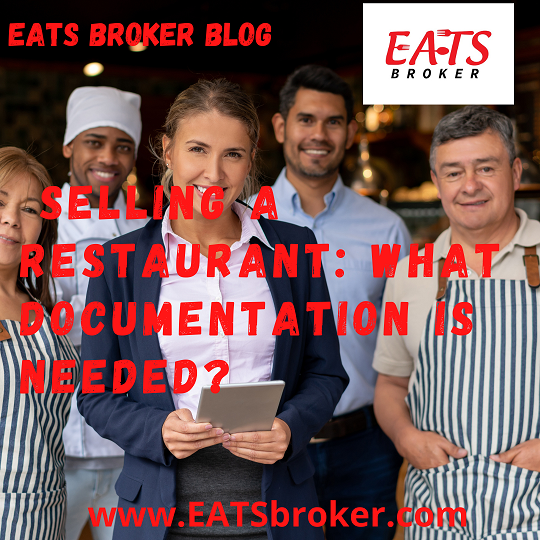When selling a restaurant, what documentation is needed from the seller? The answer is simple it depends on what type of sales transaction. Trained Restaurant Brokers use two methods when providing a Restaurant Valuation to a seller.
The most profitable and best way to sell a restaurant is based on past Profit and Loss Statements and Tax Returns. If these documentations are not available, the restaurant should be priced as an Asset Sale, meaning pennies on the dollar for the equipment and build-out.
EATS Broker breaks down the essential documentation needed for both types of transactions. We list the documentation that is provided during the due diligence period for the buyer:
Selling a Restaurant Business Based on Tax Returns and Profit and Loss Statements:
– Tax Returns for the past three years
– Profit and Loss Statements for past three years
– Copy of Lease and all amendments
– Sales Tax Clearance Letter
– POS Sales Report
– Bank Statements (sometimes)
– Balance Sheet
– Copy of Franchise Royalty Report
– Equipment List (only items owned by the seller)
– Franchise Agreement
– Sales Tax History
Selling a Restaurant priced as an Asset Sale:
– Sales Tax Clearance Letter
– Copy of Lease and all amendments
– Equipment List
– Limited Profit and Loss information
– Sales Tax History (sometimes)
– Bank Statements (sometimes)
Providing documentation for a successful and profitable business net the seller the highest asking price, can qualify for a restaurant for bank lending and attracts more buyers. Asset Sale is harder to sell and makes the Restaurant Broker work for their commission.
Asset Sale can be a challenging sale because you sell the opportunity or potential to a new buyer. You can tell when a restaurant is listed as an Asset Sale because Cash Flow and EBITDA will be low or nonexistent.
EBITDA, or earnings before interest, taxes, depreciation, and amortization, is a measure of a restaurant’s overall financial performance.
Dominique Maddox of EATS Restaurant Brokers says, “selling a restaurant business has two phases for a restaurant owner. First providing the documents needed for a valuation. Second, providing more detailed supporting documentation during the buyer’s due diligence period”.
Some restaurant owners can be frustrated and think they provided enough financial information during the valuation phase for buyers to confirm their numbers. This thinking is usually incorrect, and most buyers will ask and want to see more additional supporting documentation before arriving at the closing table.
For more information on the restaurant market and other available consulting services or a complimentary restaurant valuation, contact Dominique Maddox at 404-993-4448 or by email at [email protected]. Visit our website at www.EATSbroker.com

